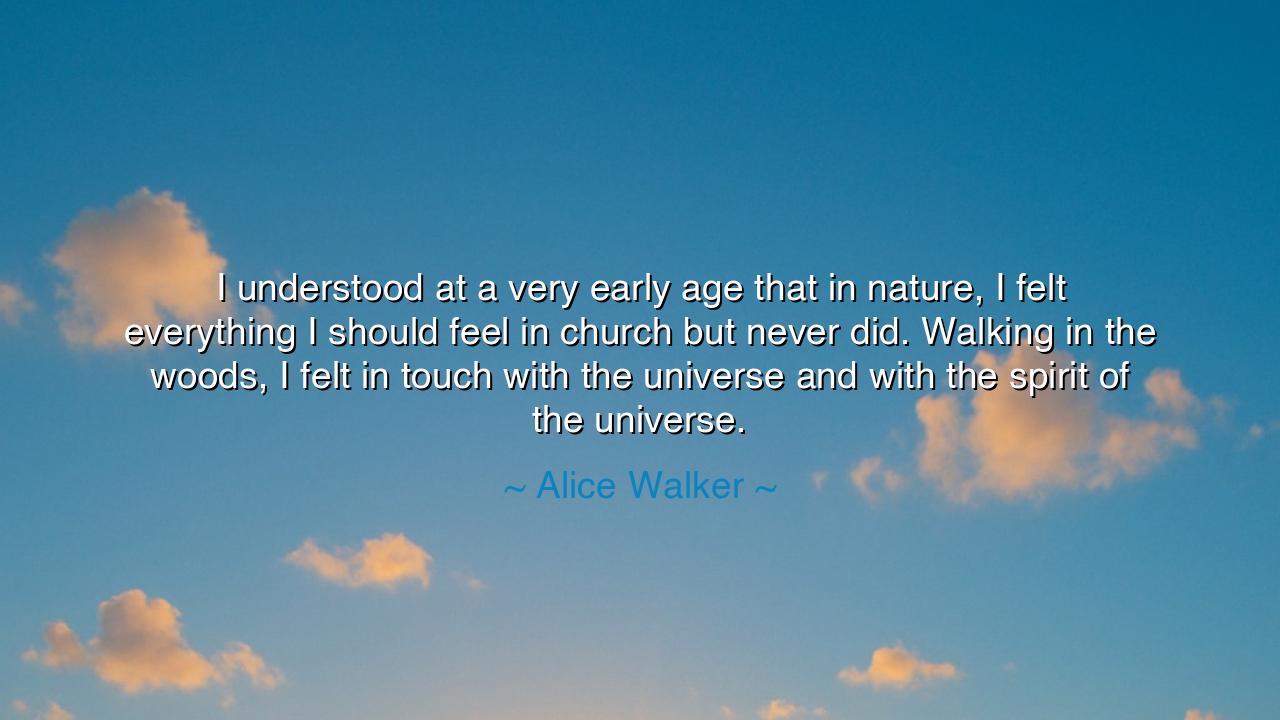
I understood at a very early age that in nature, I felt
I understood at a very early age that in nature, I felt everything I should feel in church but never did. Walking in the woods, I felt in touch with the universe and with the spirit of the universe.






In the sacred quiet of nature, there lies a connection to something ancient, eternal, and profound. The great writer Alice Walker speaks to this deep truth when she says, "I understood at a very early age that in nature, I felt everything I should feel in church but never did. Walking in the woods, I felt in touch with the universe and with the spirit of the universe." Here, Walker unveils a revelation that resonates with the wisdom of the ancients—that the spirit of the world is not confined to any building or organized ritual but flows through the very fabric of nature itself. It is a profound insight, one that calls us to recognize the sacredness in the world around us, in the trees, the soil, and the air, where the divine and the natural are one and the same.
The ancients often saw nature as the direct expression of the divine. The Greek philosophers like Heraclitus and Pythagoras understood the universe as a living organism, interconnected and full of spirit. Heraclitus spoke of the Logos, a divine force that permeates all things, shaping both the natural world and the essence of life itself. Pythagoras saw the harmony of nature as a reflection of the divine order of the cosmos. For these thinkers, to walk in nature was to walk in the presence of the sacred, to feel the pulse of the universe in every living thing. Alice Walker’s words are a modern echo of this ancient belief—that the divine spirit is not confined to human-made temples, but is reflected in the natural world, available to those who open their hearts and minds to it.
The story of Saint Francis of Assisi, the beloved saint who saw the world as an interconnected family, is a shining example of this wisdom. He famously referred to the sun, the moon, and the elements as his brothers and sisters, recognizing the divine spirit in all living things. Saint Francis’ deep connection to nature allowed him to experience the divine in a way that transcended the rituals of the church. His life exemplified the profound understanding that spirituality can be found not only in the sacred walls of a church but also in the simple act of communing with nature. Like Walker, Saint Francis felt a greater sense of peace and purpose in nature, where the divine was palpable in every leaf and every breath.
Walker’s insight also points to the disconnect many feel between organized religion and the spiritual experience. For her, and for countless others, the spiritual connection that church promises is often absent, replaced by the noise of dogma and the disconnect from the natural world. In the solitude of the woods, however, the barriers between the human spirit and the divine fall away. It is in nature that one can hear the whisper of the universe, feel the eternal pulse of life, and experience the peace that often eludes the structured walls of a temple. This truth has been recognized by many mystics and poets throughout the ages, who have turned to nature as a source of spiritual renewal. Ralph Waldo Emerson, in his essay Nature, echoes Walker’s sentiment, declaring that "in the presence of nature, a wild delight runs through the man, in spite of real sorrows."
The lesson from Walker’s words is not merely to seek solace in nature, but to recognize the spiritual power it holds. Just as the ancients revered nature as a reflection of the divine, we too must learn to find our spiritual connection in the world around us. The trees, the streams, and the mountains are not mere backdrops to our lives; they are manifestations of the universe’s spirit, offering us wisdom, clarity, and renewal. To walk through the woods or gaze upon the sea is not simply to enjoy the beauty of the world, but to step into the presence of the sacred, to feel the living breath of the cosmos itself.
What can we learn from this insight? First, we must open our eyes and hearts to the world around us, understanding that the divine is not confined to religious rituals or sacred spaces, but is present in every living thing. We must seek out moments of stillness in nature, allowing ourselves to reconnect with the rhythms of the world and the spirit that resides within it. Whether through quiet walks in the woods, sitting by a river, or gazing at the stars, we must make space in our lives to connect with the divine energy that flows through nature, knowing that in doing so, we are not merely witnessing creation, but participating in it.
Let us, then, take this wisdom with us. In our fast-paced world, where the distractions of modern life often pull us away from the sacred, we must be intentional about carving out time to commune with nature. Let us listen to the wind in the trees, feel the soil beneath our feet, and open ourselves to the profound peace that nature offers. As Alice Walker and the ancients have taught us, the divine is not found in rigid structures or distant temples, but in the very world that surrounds us. We need only to pause, to observe, and to feel in order to be reminded that we are always, always, in the presence of the spirit of the universe.






AAdministratorAdministrator
Welcome, honored guests. Please leave a comment, we will respond soon